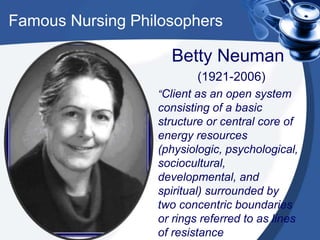Philosophical views in nursing
- 2. OBJECTIVES • To understand the meaning of philosophy and relay it to nursing profession • To understand the philosophy behind nursing practice and nursing education • To explain the significance of philosophy of nursing • To determine the purposes of philosophy • To elaborate the 2 approaches to philosophy development
- 3. PHILOSOPHY • Is defined as “love and pursuit of wisdom by intellectual means and moral-discipline”. • Is a science that comprises logic, ethics, aesthetics, metaphysics, and the theory of knowledge. • Set of beliefs and values that guide the way in which we operate in the world. • Is a statement of beliefs that guide one’s behavior and, in case, influence the practice of nursing.
- 4. SIGNIFICANCE OF PHILOSOPHY FOR NURSING • To achieve intellectual enlightenment • The individual is afforded an opportunity to exercise both understanding and value judgments • Sciences benefit from philosophy essentially because philosophy governs their methods through logic and ethics
- 5. APPROACHES TO PHILOSOPHY DEVELOPMENT • Top-Down Approach = imposed by the managerial system and is a reflection of organizational beliefs, which are not necessarily applicable to the nursing care. • Bottom-Up Approach = people will have to use the philosophy who are involved in writing it
- 6. PHILOSOPHY OF NURSING EDUCATION • Period of Intuitive Nursing / Medieval Period (Primitive Era) • Apprentice Nursing / Middle Ages (1848) • Period of Educated Nursing / Nightingale Era (1900) • Period of Contemporary Nursing / 20th Century
- 7. Period of Intuitive Nursing/Medieval Period (Primitive Era)
- 8. Apprentice Nursing / Middle Ages
- 19. Famous Nursing Philosophers Florence Nightingale (1820 –1910) “keeping the client warm, maintaining a noise-free environment, and attending to the client’s diet in terms of assessing intake, timeliness of the food and its effect on the person”.
- 20. Famous Nursing Philosophers • Mary Seacole (1805 – 1881) Jamaican healer or 'doctress' with expertise in tending victims of cholera and yellow fever epidemics during Crimean War
- 21. Famous Nursing Philosophers • Hildegard Peplau (1909–1999) “There must be a nurse- patient relationship and to help clients fulfill their needs, nurses must assumes many roles; stranger, teacher, resource person, surrogate, leader and counselor”.
- 22. Famous Nursing Philosophers Virginia Henderson (1897-1996) “Nursing in relation to client and environment concerned with both healthy and ill individuals”.
- 23. Famous Nursing Philosophers Dorothy Johnson (1905–1984) • the science and art of nursing should focus on the clients, not on the disease process itself
- 24. Famous Nursing Philosophers Imogene King (1923–2007) “the nursing domain involves human beings, families, and communities as a framework within which nurses make transactions in multiple environments with health as a goal”.
- 25. Famous Nursing Philosophers Martha Elizabeth Rogers (1914-1994) • “Humans are dynamic energy fields in continuous exchange with environmental fields, both of which are infinite”.
- 26. Famous Nursing Philosophers Lydia Eloise Hall (1906-1969) “The patient is composed of overlapping parts; person (core), pathologic state and treatment (cure) and body (care)”.
- 27. Famous Nursing Philosophers Dorothea Orem (1914–2007), “ not only when nursing is needed but also how people can be assisted through five methods of helping: acting or doing for, guiding, teaching, supporting, and providing an environment that promotes the individual’s abilities to meet current and future demands”.
- 28. Famous Nursing Philosophers Sister Callista Roy (1914) “the process and the outcome whereby the thinking and feeling person uses conscious awareness and choice to create human and environmental integration”
- 29. Famous Nursing Philosophers Betty Neuman (1921-2006) “Client as an open system consisting of a basic structure or central core of energy resources (physiologic, psychological, sociocultural, developmental, and spiritual) surrounded by two concentric boundaries or rings referred to as lines of resistance
- 30. Famous Nursing Philosophers Madeline Leininger “Care is the essence of nursing and the dominant, distinctive and unifying feature of nursing”.
- 31. Famous Nursing Philosophers Rose Marie Risso Parse “Client, not the nurse is the authority figure and decision maker, the nurse’s role involves helping individuals and families in choosing the responsibilities for changing the health process”
- 32. Famous Nursing Philosophers Margaret Newman “Humans are unitary beings in whom disease is a manifestation of the pattern of health. every person in every situation, no matter how disordered and hopeless it may seem, is part of the universal process of expanding consciousness – a process of becoming more of oneself, of finding greater meaning in life, and of reaching new dimensions of connectedness with other people and the world
- 33. Famous Nursing Philosophers Ida Jean Orlando (1926) She believed that the nurse helps patients meet a perceived need that the patients cannot meet for themselves.
- 34. Famous Nursing Philosophers Jean Watson “Philosophy and Science of Caring (1988)”
- 35. PHILOSOPHY AND SCIENCE OF CARING • The practice of caring is central to nursing; it is the unifying focus for practice • Watson's idea of person contains the beliefs that human have potential for what they may become and are free to make responsible choices.
- 36. 10 PRIMARY CARATIVE FACTORS 1. The formation of a humanistic- altruistic system of values. 2. The installation of faith-hope. 3. The cultivation of sensitivity to one’s self and to others. 4. The development of a helping-trust relationship 5. The promotion and acceptance of the expression of positive and negative feelings.
- 37. 10 PRIMARY CARATIVE FACTORS 6. The systematic use of the scientific problem- solving method for decision making 7. The promotion of interpersonal teaching- learning. 8. The provision for a supportive, protective and /or corrective mental, physical, socio-cultural and spiritual environment. 9. Assistance with the gratification of human needs. 10.The allowance for existential- phenomenological forces.





































